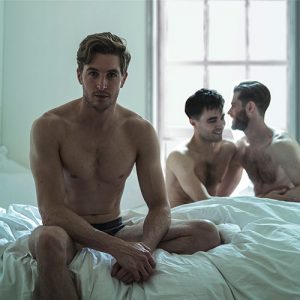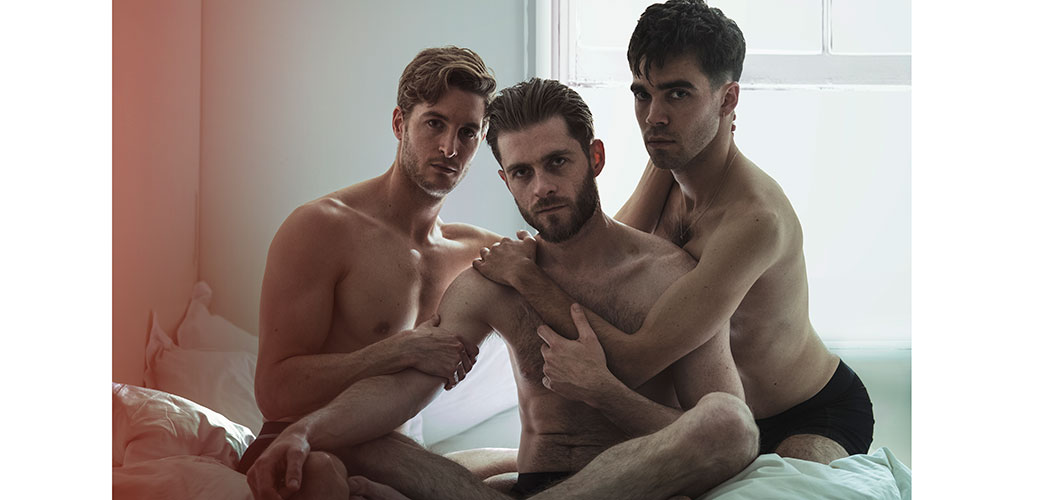Afterglow opens next Wednesday at the Southwark Playhouse following a multiple-extended hit run Off-Broadway. It tells the story of the impact a third person has on the open relationship of two gay men. We spoke to writer S. Asher Gelman about this fascinating and emotional play.

You have spoken before about Afterglow being inspired by your own experiences of being in an open relationship, what was the reason for writing the play?
Part of the reason I wrote Afterglow was to help dissolve the marriage between sex and shame. We live in a culture that continuously bombards us with the promise and allure of sex while simultaneously shaming us for engaging in it. Sex is a biological function; it’s something we are hardwired to desire. When we are thirsty, we drink. When we are hungry, we eat. When we are horny, we fuck. When we allow others to govern our biological functions, in this case, sexual expression, we give away our power. Sex is powerful. Truth is powerful.
What has been the impact of the play on your own life?
My husband and I used to live in Tel Aviv and were not open about our open relationship. When we moved, I told my husband that I was tired of giving fucks about what other people think. I’d rather be hated for who I am than loved for who I’m not. Then Afterglow opened and our private life was on display eight times a week for 14 months. Being open about my sex and love life, particularly in such a public context, has been incredibly freeing. I don’t have to keep any secrets or fabricate any lies. I get to be the same person in every room I enter. I also realize that not everyone has the luxury of being as open about their lives as I am, so I am exceptionally grateful for that. It is truly a gift, and absolutely worth it.
Is Afterglow a play that will only appeal to gay audiences?
Afterglow was never designed to be a gay play. It is a play about three men who have sex with men, but there’s no mention of any of the traditionally gay tropes: there’s no mention of HIV/AIDS, coming out, homophobia, or even sexual orientation. There’s no “inside joke” in the piece that only gay men will “get”; the piece was designed to be universally accessible. It’s interesting how, even in 2019, we still ask ourselves if straight people can relate to our stories. I’ve never once had anyone ask me whether or not I could relate to a piece of theatre that lacked gay characters. Not once.

How did you feel when Afterglow became such a massive hit – that this was something that audiences were really responding to?
The calibre of the artists involved in this project and the passion they had for it led to the creation of a piece that was far greater than anything I could have built by myself. I hope to continue working with them on project after project, for years and years to come. That said, the success of Afterglow has been incredibly validating, especially since it was my first play. As an artist whose primary focus had been dance and choreography, it gave me the confidence to continue creating theatre.
Were you asked to make any adjustments for UK audiences for the London production?
There was a brief moment when I considered adapting it to be set in London rather than New York City, but I realized that so much of the vernacular would have to be adjusted that it wouldn’t really be my play anymore. Luckily, I’m told that UK audiences also speak English.
What would you say to someone who asked you for advice about trying an open relationship?
I wouldn’t recommend it for everyone, but I would say it’s a good idea to discuss the subject of monogamy. If you are considering an open relationship (even if you’re not), you need to learn how to communicate effectively and honestly with your partner. You also need to understand that you will make mistakes; you need to be willing to navigate them together. You will get jealous sometimes; jealousy is okay, as long as you discuss it with your partner. The more you bottle up your feelings (whether they be of jealousy or something else), the more explosive they become when they finally (and inevitably) release themselves into the world, so it’s critical to discuss your feelings before they grow into issues. In general, effective and honest communication is the key to any healthy relationship, regardless of whether or not you are monogamous.

What do you hope that people feel when watching Afterglow?
Art should challenge the way we think and change how we react to the world around us. I hope audiences take away the importance of having the difficult conversation, whatever that may be, and then actually have it. When presented with the choice between having a difficult and necessary conversation or simply avoiding it altogether, we often choose avoidance, in favour of maintaining the status quo. Many people told us they broke up with their partners because of the conversations the play brought up. I am glad that this little play allowed them to have those difficult and necessary conversations and am glad those conversations brought clarity, even if that clarity ultimately ended their relationships. This culture of toxic monogamy has taught us that the worst thing in the world is to be “alone”; there is nothing lonelier than being in a relationship with the wrong person.
What’s next for you?
My second play, safeword., opened Off-Broadway in April. It’s a sinfully delicious exploration of power dynamics through BDSM and food. We’re currently slated to run through 7 July, so if you’re in New York before then (especially if you’re coming for WorldPride), come check us out. After that, I’m not sure what’s next. I have a few projects I’m working on, but nothing I’m at liberty to discuss at the moment. To keep appraised of my movements, visit www.sashergelman.com or follow me on Instagram @dancingasher.
Afterglow at Southwark Playhouse, 77-85 Newington Causeway, London SE1 6BD. Box office: 020 7407 0234 southwarkplayhouse.co.uk














